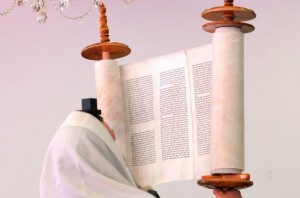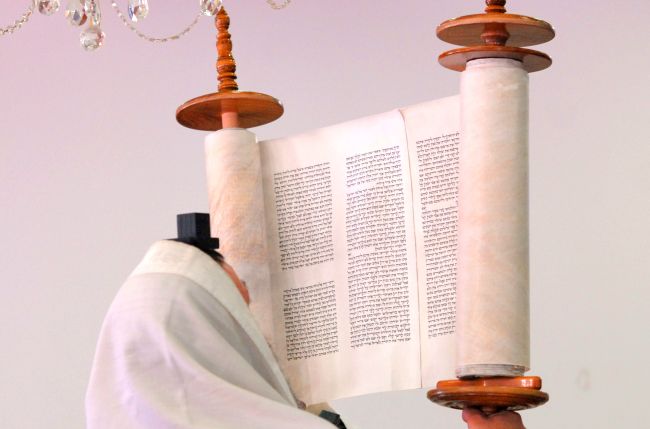
“RavFrand” List – Rabbi Frand on Parshas Pinchas
These divrei Torah were adapted from the hashkafa portion of Rabbi Yissocher Frand’s Commuter Chavrusah Tapes on the weekly portion: Tape # 336, Tisha B’Av on Motzoei Shabbos.
This is the last shiur before the summer break. The shiur will resume in Elul. Good Shabbos!
In last week’s parsha, Pinchas turned back Hashem’s anger towards the Jewish people through his act of kanaus (zealotry). The Halacha states that – subject to very strict conditions – a kanai (zealot) may kill a “boel aramis” (a person who is engaged in a specific type of public sexual immorality). As a payment to Pinchas for his act, Hashem gave Pinchas His Brisi Shalom (Covenant of Peace). Many commentators are bothered by the appropriateness of this reward. A kanai is usually understood to be someone who engages in arguments and controversy. Why is peace the appropriate reward?
There is an interesting Medrash that contains an implied criticism of Moshe Rabbeinu: “Since Moshe was passive during this incident, no one knows the location of his grave. This teaches us that a person must be as bold as a leopard, nimble as an eagle, speedy as a deer, and mighty as a lion to do the will of his Creator.” This Medrash indicates that the anonymity of Moshe’s gravesite is a punishment for the very slight infraction of Moshe not performing this act of kanaus himself. The Medrash itself points out that this is an example of Hashem acting meticulously with the righteous, measuring their actions with precision.
Properly performing an act of kanaus is not something that just anyone can take upon themselves. The person must be at the highest spiritual level. But the Medrash here faults Moshe Rabbeinu in the context of Hashem measuring the acts of the righteous “by a hair’s breadth.”
Rav Mordechai Gifter (Rosh Yeshiva, Telshe Yeshiva, Cleveland Ohio) emphasizes a very important point. The Torah describes Pinchas, or anyone who kills a person who is demonstrating this public immorality, as a “kanai”. People tend to translate the word “kanai” to mean an “extremist.” Rav Gifter writes that this is incorrect. As the Rambam writes (Hilchos Dayos 1:4), Judaism does not appreciate extremism. The middle path, the “golden mean” is the way the Torah advises people to act. “Kanaus” is not extremism.
Quoting the Sifrei, Rav Gifter defines kanaus as the act of sublimating a person’s entire self to the wants of Hashem, to the extent that the person is willing to give up his life, if necessary. That is why not all of us can assume the mantle of kanaus. Torah-sanctioned kanaus is reserved for those people who are willing to make the ultimate sacrifice for Hashem. When a personal agenda does not exist — when all that exists is Hashem’s honor — then, and only then, do we consider a person’s actions to be in the category of Torah-sanctioned kanaus. If a person’s motives are not completely pure — if there is an admixture of other motives to the act of kanaus — then it ceases to be an approved act of kanaus.
Consequently, it is highly appropriate that the reward for this act is the Brisi Shalom. Shalom does not necessarily mean peace. Shalom means perfection, as in the word “shalem” (complete). When a person performs an act of kanaus, such that his will and Hashem’s will become one, then he has achieved shleimus (completeness) with his Maker. The gift of shalom, meaning shalem is thus highly appropriate.
The chachomim (sages) say that despite the fact that Moshe Rabbeinu erred — if we can even use that word — by failing to assume the mantle of kanaus, Moshe corrects this passivity in next week’s Parsha. In Parshas Mattos, Moshe is commanded to “Seek revenge for the children of Israel against the Midianites, then be gathered into your nation” (Bamidbar 31:2). The chachomim infer from this connection between seeking revenge against Midyan and Moshe dying that Moshe had the ability to extend his lifetime. His death was dependent on his first taking revenge against Midyan. Moshe, in effect, had a blank check. He could have taken two years or five years or ten years to seek revenge against Midyan. What did Moshe do? Moshe immediately proceeded to take revenge against Midyan, knowing full well that its completion would pave the way for his own imminent demise. Here, Moshe performed the ultimate act of kanaus.
Kanaus is completely sublimating personal desires to the point that the person is prepared to even give up his life for Hashem. That is precisely what Moshe Rabbeinu demonstrates in Parshas Mattos. This is why Chazal view that incident as a kaparah (an atonement) for his passiveness during the incident at the end of last week’s parsha.
The ‘Sin’ of the Father Passes Down to the Son to Demonstrate True Parenthood
There is a famous comment of the Da’as Zekeinim m’Baalei haTosfos that appears in Sefer Bereishis.
There is a census in this week’s parsha that enumerates the various families of the Jewish nation. One pasuk (verse) contains the phrase, “Yoshuv of the family of Yoshuvi” (Bamidbar 26:24). Yoshuv was one of the sons of Yissocher. However, in Parshas Vayigash, where the descendants of the shevatim (tribes) who went down to Mitzraim are listed, there is no such son of Yissocher listed. However, there is a son of Yissocher listed named Yov (Bereishis 46:13).
The Da’as Zekeinim makes the following enigmatic comment. There is a controversy as to how the name Yissocher (which is spelled with a double letter ‘sin’) is pronounced. Do we pronounce both ‘sin’s (Yissoscher) or just one of them (Yissocher)? Prior to Parshas Pinchas, where Yissoscher’s son is always called by the name Yov (without an extra ‘sin’), we pronounce Yissascher with both ‘sin’s. Starting here in Parshas Pinchas, we pronounce Yissocher, as if it were written with only one ‘sin’. What happened?
The chachomim say that Yov complained to his father that he had the same name as an idol and he did not like the name. Therefore, his father took a ‘sin’ from his own name and gave it to his son, whose name became Yashuv. From this point forward, we read Yissocher’s name with a single ‘sin’.
Rav Gifter quotes a simple question (from Rav Chaim Elezari). Why was this necessary? We do not need a ‘donor’ in order to add a letter. Why couldn’t any letter or name be added without removing it from someone else?
Rav Gifter says that the answer is obvious. This is a father who is trying to protect his son. Has there ever been a father who spared anything to guarantee that his son was protected? That is what parenting is all about. Nothing concerns us like the welfare of our children. “I am not going to rely on just any old ‘sin’ from the Aleph-bais. I am not sure that just any ‘sin’ will do the trick. I am giving you MY ‘sin’. My name will be different. My name will be lacking something and so will I. But that does not concern me in the least – because I am a father and my son’s welfare is all that counts! I insist on giving you the very best letter – one that comes straight from my name – to make sure that you are protected.” That is a father and that is love.
The gematria (numeric value using system of ascribing numeric values to Hebrew letters) of ‘ahavah’ (love) is 13 (1+5+2+5). The gematria of ‘da’agah’ (worry) is also 13 (4+1+3+5). Ahavah = Da’agah (Love = Worry). Every parent can appreciate this gematria. Being a parent means losing sleep, caring and worrying. It means looking at the clock, going to the window, and pulling the curtain. Why aren’t they home yet? Why haven’t they called? Ahava = Da’agah. This is what parenthood is all about.
Transcribed by David Twersky; Jerusalem [email protected]
Edited by Dovid Hoffman; Baltimore, MD [email protected]
This week’s write-up is adapted from the hashkafa portion of Rabbi Yissochar Frand’s Commuter Chavrusah Series on the weekly Torah portion. A listing of the halachic portions for Parshas Pinchas is provided below:
- # 064 – The Yarmulka: At Home and In the Office
- # 154 – Writing a Halachically Sanctioned Will
- # 201 – Fasting on Tisha B’Av: Is It For Everyone?
- # 246 – Hilchos Brachos: Ikar Ve Tofel
- # 291 – The Do’s and Don’t of Kashering Keilim
- # 336 – Tisha B’Av on Motzoei Shabbos
- # 381 – Making A Zecher Le’churban
- # 425 – Minhagim of the Three Weeks
- # 469 – Tu B’Av
- # 513 – Leining on Fast Days and Other Ta’aneisim Issues
- # 557 – Disinheriting
- # 645 – Women and Bentching
- # 688 – A Manicure on Shabbos?
- # 732 – Does A Mezuza Need a Door?
- # 776 – Yayin Mevushal – Does It Exist?
- # 821 – Cholent on Sunday of the Nine Days
- # 865 – Neckties,Shoelaces and Tichels: A Knotty Problem
- # 909 – Shabbos Shacharis – Hashkama Vs Later
- # 953 – Tevilas Keilim: My Hosts Haven’t Toiveled Their Dishes
- # 995 – The Mitzva of Shiluach Ha’Kain – Do We Make A Bracha?
- #1040 – Learning on Tisha B’av? Saying Tehilim on Tisha B’Av?
- #1084 – The Kohain Who Killed Someone by Accident: Can He Still “Duchan”?
- #1127 – Tei’ku – What Will Eliyahu Answer?
- #1169 – 17 Tamuz–When Does It Start? Wearing Laundered Shirts In Nine Days?
- #1212 – Goral: Can You Have A Raffle For A Sefer Torah?
- #1257 – Learning on Tisha B’Av, Should You? Can You? Eating Tisha B’Av Night So You Can Fast on Tisha B’Av Day?
- #1301 – A Tisha B’av Message: The Golden Rule – Don’t Do Unto Others What You Don’t Want Done Unto You
- #1345 – Bathing During the Nine Days
- #1389 – The Case of the Rabbi Who Said I Want My Son To Assume My Position When I Retire – Can He Demand That?
- #1433 – The Use of a Goral in Halacha
- #1521 – Bris During Nine Days: Fleishigs or Milchig? Shabbos Leftovers for Sunday Night Dinner?
A complete catalogue can be ordered from the Yad Yechiel Institute, PO Box 511, Owings Mills MD 21117-0511. Call (410) 358-0416 or e-mail [email protected] or visit http://www.yadyechiel.org/ for further information.


